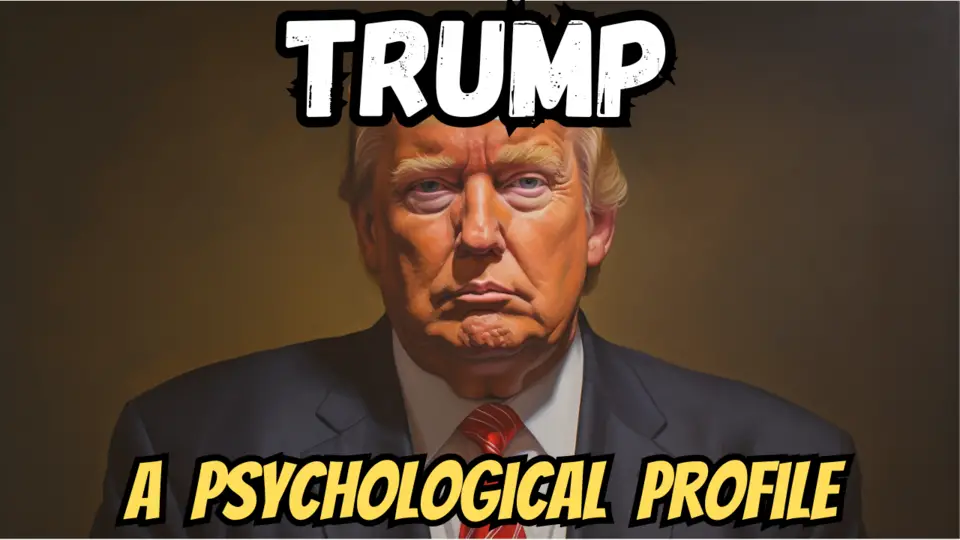Donald Trump is a figure who has garnered attention not just for his politics but also for his larger-than-life personality. Understanding his psychological profile is a complex endeavor, as Trump embodies a range of characteristics that make him a topic of perpetual discussion among psychologists, political analysts, and the public at large.
In this article I will start with a discussion about several key psychological elements that can help shed light on Trump’s mindset and behavior followed by an analysis of his leadership style using the Big Five Personality Model.
Disclaimer: The information presented in this article is not intended to diagnose or provide a clinical analysis of Donald Trump. The perspectives offered are based on observed behavior, public statements, and actions, analyzed through the lens of psychological theories.
A quick biography of Donald Trump
Donald J. Trump, the 45th President of the United States, is a figure who elicits strong reactions from people across the political spectrum. Born on June 14, 1946, in Queens, New York, Trump inherited a real estate empire from his father and went on to establish his brand through various business ventures, television appearances, and licensing deals. He has been a real estate mogul, television personality, and the author of several books before stepping into the political arena. Trump’s decision to run for president in 2016 as a Republican candidate shocked many, but his unorthodox approach and divisive rhetoric won him the electoral college, though not the popular vote. His presidency from 2017 to 2021 was marked by significant policy shifts, impeachment trials, and a highly polarized national atmosphere.
Donald Trumps’ Psychological Profile:
Narcissistic Personality Traits
Many experts have observed that Trump exhibits traits commonly associated with Narcissistic Personality Disorder, though it should be stressed that only a qualified medical professional can make such a diagnosis. Traits of narcissism include a grandiose sense of self-importance, a preoccupation with fantasies of unlimited success, and a lack of empathy.
Throughout his time in the public eye—well before his political career—Trump has displayed behaviors consistent with these traits. His frequent self-aggrandizement, the ‘Trump’ brand’s omnipresence, and his lack of concern for others’ viewpoints are often cited as evidence of narcissistic tendencies.
Authoritarianism
Trump’s leadership style has often been described as authoritarian. He values loyalty over expertise and has shown an inclination to dismiss those who disagree with him. Authoritarian tendencies are usually rooted in the desire for control and order, possibly arising from a fear of loss or chaos. This perspective helps to explain his “law and order” stance, his confrontational approach toward allies and adversaries alike, and his reluctance to delegate authority.
Machiavellianism
Trump’s behavior can also be examined through the lens of Machiavellianism, which is characterized by a focus on self-interest, manipulation, and a lack of morality when achieving one’s goals. His readiness to alter facts, manipulate information, and use divisive issues for political gain can be seen as Machiavellian tactics. While these traits are not unique to Trump, they have been particularly pronounced in his public persona.
Cognitive Dissonance
The concept of cognitive dissonance—holding contradictory beliefs or values—may also be relevant to understanding Trump. For instance, he has presented himself as both a successful businessman and a champion for the working class, despite these roles often being at odds with each other. This dissonance has been a point of curiosity and criticism, as observers question how he reconciles these contrasting images.
Emotional Intelligence
One aspect that differentiates Trump from many other political leaders is his instinctive understanding of his base’s emotional landscape. While he may lack the analytical form of intelligence traditionally associated with leaders, his capacity to connect with people on an emotional level has been a defining feature of his public life. His simple, direct language and his ability to tap into prevailing social sentiments—however controversial—cannot be easily dismissed.
READ MORE: What is a Psychological Profile? 10 Key Elements
Understand Donald Trump through the Big Five Personality Model:
The Big Five Personality Model, which breaks down personality into five core dimensions—Openness, Conscientiousness, Extraversion, Agreeableness, and Neuroticism—provides an informative framework for this discussion.
Again, a disclaimer: The Big Five Model is a well-recognized psychological tool but should not be considered a definitive measure of an individual’s personality.
Openness to Experience
Openness in the Big Five model refers to an individual’s willingness to embrace new experiences, ideas, and change. Trump’s level of openness can be described as moderate. He is clearly open to unconventional ideas and approaches, as evidenced by his unorthodox campaign style and governance. However, he often leans on established norms that align with his worldview, such as traditional business practices and conservative ideologies. His selective openness has garnered both admiration for his boldness and criticism for perceived narrow-mindedness.
Conscientiousness
Conscientiousness involves traits such as organization, dependability, and self-discipline. Trump’s approach to these aspects is mixed. On one hand, he’s shown a willingness to pursue goals doggedly and is highly self-confident. On the other hand, he has often been criticized for a perceived lack of preparation, organization, and attention to detail. His management style tends to be improvisational rather than structured, which clashes with traditional views on conscientious leadership.
Extraversion
Donald Trump scores high on the extraversion scale. He is outgoing, assertive, and thrives in social situations. His affinity for public speaking, television appearances, and social media engagement attest to this. Trump loves the limelight and enjoys the energizing effect of public adulation. This aspect of his personality is among the least disputed; whether people admire or criticize him, they largely agree that he is, above all, an extrovert.
Agreeableness
Agreeableness measures traits like empathy, cooperation, and warmth. Based on publicly observable behaviors, Trump scores low on this scale. He has shown a propensity for confrontation over compromise and often adopts a zero-sum approach to negotiations. His dismissive treatment of critics and propensity for ad hominem attacks are often cited as evidence of low agreeableness. This is not to say that he is incapable of charm or persuasion—traits often associated with higher levels of agreeableness—but his general orientation leans towards assertiveness over congeniality.
Neuroticism
Neuroticism relates to emotional stability and the propensity for experiencing negative emotions like anxiety, depression, and anger. Publicly, Trump seems to display low levels of neuroticism. He exudes self-confidence and rarely admits to anxiety or insecurity. However, his frequent Twitter outbursts and confrontational style have led some to speculate that he may experience a high level of emotional volatility, a characteristic of higher neuroticism.
READ MORE: Understanding Psychology from A to Z
Conclusions
Donald Trump’s personality, as observed through the lens of the Big Five model, is a blend of high Extraversion, moderate Openness, mixed Conscientiousness, low Agreeableness, and ambiguous Neuroticism. While this observational analysis is far from exhaustive, it provides a structured framework for understanding a highly unstructured personality. As with any public figure, the complexities of Trump’s personality cannot be fully captured by any single model, but the Big Five offers a useful starting point for discussion.
Donald Trump’s psychological profile is a tapestry of complex traits and behaviors, some of which align with known psychological theories. Understanding these elements does not condone or condemn his actions but offers a lens through which to view and interpret them. As one of the most polarizing figures in recent history, gaining insight into his psychological makeup can provide a richer understanding of the man, the politician, and the cultural phenomenon that is Donald Trump.
Now watch the video presentation:



